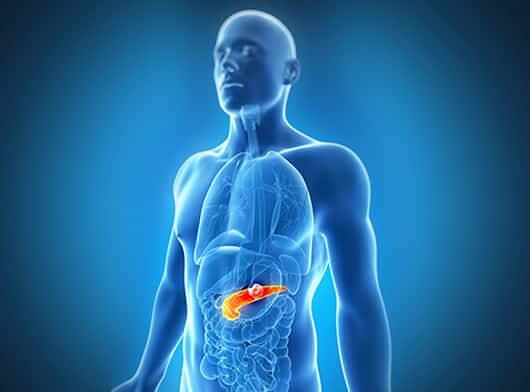- Imaging
- Laboratory
- CT scan is a diagnostic imaging procedure that uses x-rays to build cross-sectional images of the body. It also helps to identify the spread of cancer. The specific types of CT scans are done for Pancreatic cancer namely Pancreatic protocol CT scan, help to identify pancreatic lesions and then do CT-guided needle biopsy if required.
- PET CT accesses the spread to regional nodes or distant metastases to other body parts. It provides functional and morphological details by utilising radiation derived from Isotope labelled Glucose molecules to detect cellular glucose uptake in cancer.
- Magnetic Resonance Imaging (MRI) uses radio waves and strong magnets instead of x-ray to make detailed images of the body. MRI abdomen to identify Pancreatic lesions gets done in some instances where CT cannot happen or is inconclusive.
- Endoscopy involves inserting an endoscope (a long, narrow tube attached to a camera and light) through the mouth and down the throat to examine the insides.
- Endoscopic Ultrasound (EUS) uses an ultrasound device to make images of the pancreas from inside the abdomen. It is done in certain cases to determine the extent of the local spread of cancer to other lymph nodes and important vascular structures.
- Endoscopic retrograde cholangiopancreatography (ERCP) - Stenting can help relieve the biliary blockage in this procedure.
- Biopsy - Tissue confirmation of malignancy is required before initiation of chemotherapy or radiation is required. Sometimes, the surgeon might directly go ahead with surgery without tissue biopsy if the lesion is resectable. The biopsy can be attained by variety of means
- Endoscopic Biopsy with EUS / ERCP
- Image Guided Biopsy
- Surgical biopsy - Done with laparoscopic or post-surgical frozen section if biopsy could not be done through either endoscopy or Image-guided two methods
- Angiography is an x-ray test used to study blood flow in the blood vessels and indicate if there is any blockage or obstruction. The doctor takes an Angiography can also be done with a CT scan (CT angiography) or an MRI (MR angiography). The doctor might order this scan to rule out the invasion of adjacent significant vessels.
- Blood Test - The physician may order specific blood tests to aid in the diagnosis of Pancreatic tumours.
- Tumour markers - Certain proteins in the blood such as CEA and CA 19-9 are elevated in GI and Pancreatic cancers. Since other types of cancer and noncancerous conditions may also lead to elevated CA 19-9 levels, it should analyse it carefully along with other diagnostic methods
- Pathology - The tissue sample obtained is sent for further evaluation, such as Histopathological examination (HPE) and Immunohistochemistry (IHC), to determine type of disease and its grading.
-
Gene Tests and Genetic Counselling- The doctor may suggest genetic counselling if there is a family history of Pancreatic cancer or any other cancer in the family.
After a detailed clinical history, they may take genetic tests such as the BRCA genes (BRCA1 or BRCA2) or NTRK genes to diagnose the hereditary conditions.



.png)
